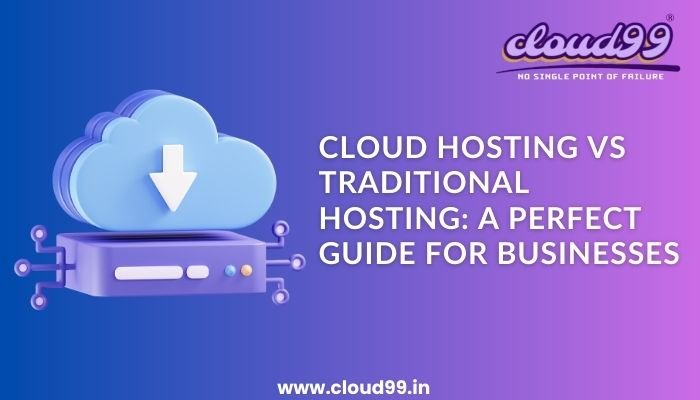Introduction

In the digital age, businesses must carefully consider their hosting options to ensure optimal performance, security, and cost-efficiency. There are mainly two types of hosting solutions that confuse businesses are Traditional Hosting and Cloud Hosting. In this blog, We are going to discuss the comparison between these two hosting solutions. Let’s Dig in:
What is Cloud Hosting and Traditional Hosting?
Cloud Hosting is a type of web hosting that uses multiple servers to balance the load and maximize uptime. It allows for resources to be scaled up or down based on demand, providing flexibility and efficiency. This type of hosting leverages the power of cloud computing, where data and applications are stored and managed on remote servers accessible via the Internet.
Traditional Hosting, On the other hand, Traditional Hosting typically involves a single server or a fixed set of servers to host websites and applications. This includes shared hosting, dedicated hosting, and VPS (Virtual Private Server) hosting, where resources are allocated based on the hosting plan chosen by the user. Traditional hosting often involves hosting a website on a physical server located in a data center, with fixed resources such as CPU, RAM, and storage.
Main Distinctions Between Traditional Hosting and Cloud Hosting
-
Scalability:
Cloud hosting offers unparalleled scalability, allowing businesses to easily adjust their resources as needed. Traditional hosting often requires manual intervention to upgrade or downgrade resources. For instance, with cloud hosting, a sudden spike in traffic can be managed effortlessly by allocating additional resources on the fly. In contrast, traditional hosting may struggle to cope with increased demand, leading to potential downtime and performance issues.
-
Reliability:
Cloud hosting provides high reliability with multiple servers ensuring minimal downtime. Traditional hosting relies on a single server, making it more susceptible to hardware failures. In cloud hosting, if one server fails, the workload is automatically distributed to other servers, ensuring uninterrupted service. Traditional hosting, however, can experience significant downtime if the primary server encounters issues, as there are no backup servers to take over the load.
-
Performance:
With cloud hosting, the load is distributed across multiple servers, resulting in better performance and faster load times. Traditional hosting performance can be affected by the limitations of a single server. Cloud hosting environments are optimized to handle high traffic volumes and deliver consistent performance, whereas traditional hosting may experience bottlenecks during peak usage periods.
-
Flexibility:
Cloud hosting offers greater flexibility, enabling businesses to choose specific resources and pay only for what they use. Traditional hosting plans are usually rigid, with fixed resources and pricing. This flexibility allows businesses to customize their hosting environment to suit their unique requirements, without being constrained by predefined plans.
Pricing Differences Between Traditional and Cloud Hosting
Traditional Hosting pricing is typically based on a fixed monthly or annual fee. The cost depends on the type of hosting (shared, dedicated, VPS) and the resources included in the plan. Shared hosting is usually the most affordable option, followed by VPS hosting, and then dedicated hosting, which is the most expensive due to the dedicated resources and hardware involved.
Cloud Hosting pricing, however, is more flexible and often follows a pay-as-you-go model. Businesses are billed based on the actual usage of resources, which can lead to cost savings during periods of low demand. This pricing model allows businesses to avoid overpaying for unused resources and only pay for what they need at any given time. Additionally, cloud hosting providers often offer various pricing tiers and plans to accommodate different budget requirements.
How Cloud99 is One of the Best Cloud Hosting Providers in India
Cloud99 stands out as one of the leading cloud hosting providers in India due to its robust infrastructure, exceptional customer support, and competitive pricing. Key features include:
-
High Performance:
Cloud99 offers lightning-fast speeds and superior performance by utilizing cutting-edge technology and high-quality servers. Their infrastructure is designed to handle high traffic volumes and deliver consistent performance, ensuring that businesses can provide a seamless user experience to their customers.
-
Scalability:
With Cloud99, businesses can easily scale their resources up or down, ensuring they only pay for what they need. This scalability allows businesses to adapt to changing demands and avoid the limitations of traditional hosting.
-
Security:
Cloud99 provides top-notch security features, including advanced encryption, regular backups, and DDoS protection to safeguard business data. These security measures help protect sensitive information and ensure the integrity of business operations.
-
24/7 Support:
The dedicated support team at Cloud99 is available around the clock to assist customers with any issues or queries. Their knowledgeable and responsive support staff ensures that businesses receive prompt assistance whenever they need it.
-
Competitive Pricing:
Cloud99 offers affordable and transparent pricing plans, making it an excellent choice for businesses of all sizes. Their flexible pricing options allow businesses to find a plan that fits their budget and requirements, without compromising on quality or performance.
Conclusion:
Choosing between cloud hosting and traditional hosting depends on the specific needs and goals of a business. While cloud hosting offers superior scalability, flexibility, and performance, traditional hosting can be a cost-effective solution for smaller websites with fixed resource requirements. Cloud99, with its exceptional features and customer-centric approach, is a top contender for businesses seeking reliable and efficient cloud hosting solutions in India.
By carefully evaluating the pros and cons of each hosting option, businesses can make an informed decision that aligns with their objectives and supports their growth. Whether opting for the flexibility of cloud hosting or the simplicity of traditional hosting, the right choice can significantly impact a business’s online presence and success.














































